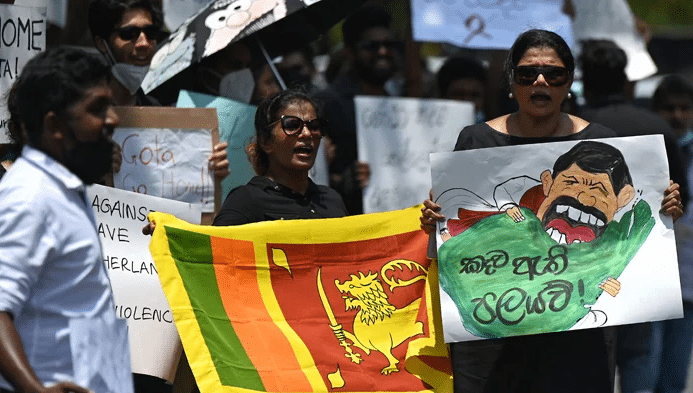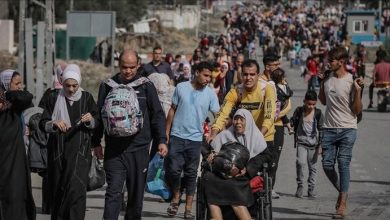Sri Lanka opposition rejects unity offer, demands president resign

COLOMBO: Sri Lanka’s opposition on Monday dismissed the president’s invitation to join a unity government as “nonsensical” and instead demanded he resign over the country’s worsening shortages of food, fuel and medicines.
President Gotabaya Rajapaksa’s overture came as armed troops looked to quell more demonstrations over what the government acknowledges is the country’s most severe economic crisis since independence from Britain in 1948.
The president asked opposition parties represented in parliament to “join the effort to seek solutions to the national crisis,” after the late-night resignation of nearly all cabinet ministers to pave the way for a revamped administration.
“We will not be joining this government,” Eran Wickramaratne of the main opposition Samagi Jana Balawegaya (SJB) party told AFP. “The Rajapaksa family must step down.”
It capped a day of rejections from political parties demanding the once popular and powerful ruling family relinquish power.
“He really must be a lunatic to think that opposition MPs will prop up a government that is crumbling,” lawmaker Anura Dissanayake of the leftist People’s Liberation Front (JVP) told reporters in the capital Colombo.
And Abraham Sumanthiran of the Tamil National Alliance told AFP: “His offer to reconstitute the cabinet with opposition MPs is nonsensical and infuriates the people who have been demanding his resignation.”
Every member of Sri Lanka’s cabinet except the president and his elder brother, Prime Minister Mahinda Rajapaksa, resigned late Sunday.
The country’s central bank governor Ajith Cabraal — who has long opposed the International Monetary Fund bailout now being sought by the country — also stepped down on Monday.
A day after en masse resignations, the president reappointed four of the outgoing ministers — three of them to their old jobs — while replacing brother Basil Rajapaksa as finance minister with the previous justice chief.
‘Deck chairs on the Titanic’
Political analysts said the offer of a unity government did not go far enough to address the economic crisis or restore confidence in the Rajapaksa administration.
“This is like re-arranging the deck chairs on the Titanic,” Bhavani Fonseka, political analyst and human rights lawyer, told AFP. “This is a joke.”
Political columnist Victor Ivan told AFP that a cabinet reshuffle in the guise of a national government would not be acceptable to the public.
“What is needed is a serious reform programme, not just to revive the economy but address issues of governance,” Ivan told AFP.
A critical lack of foreign currency has left Sri Lanka struggling to service its ballooning $51-billion foreign debt, with the pandemic torpedoing vital revenue from tourism and remittances.
The result has seen unprecedented food and fuel shortages along with record inflation and crippling power cuts, with no sign of an end to the economic woes.
Trading was halted on the country’s stock exchange seconds after it opened Monday as shares plunged past the five percent threshold needed to trigger an automatic stop.
Economists say Sri Lanka’s crisis has been exacerbated by government mismanagement, years of accumulated borrowing and ill-advised tax cuts.
The government plans to negotiate an IMF bailout, but talks are yet to begin.
‘Step down Rajapaksa’
Noisy demonstrations have spread across the country since Sunday evening with thousands of people joining.
Thousands of young men and women dressed mostly in black and carrying hand-written posters and placards staged a noisy but peaceful demonstration at a busy roundabout in Colombo on Monday.
“Step down Rajapaksa,” said one placard, while another read: “Return the funds stolen from the republic.”
“Gota lunatic, go home Gota,” crowds chanted elsewhere in the city, referring to the president, who imposed a state of emergency last week, the day after a crowd attempted to storm his residence.
The homes of several senior administration figures in various parts of the island were surrounded by protesters, with police firing tear gas to disperse the crowds.





